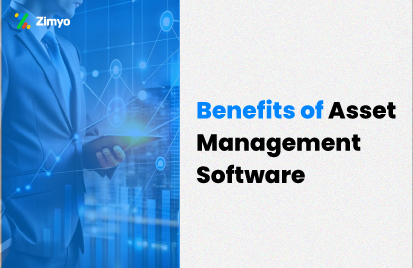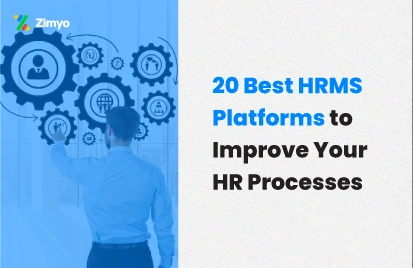Running a business feels exciting. The thrill of building something from the ground up, working closely with your team, and serving your customers directly. But during that process one of the biggest challenges that most small business owners face is managing employees effectively. Payroll, leave requests, performance reviews, compliance… it’s a lot to handle.
Unlike big businesses that can allocate large HR departments, small companies usually have only one HR individual, or sometimes the business owner himself/herself takes care of everything people related. This is where Top HR software for small businesses makes a world of difference.
Instead of struggling with spreadsheets and endless emails. You can benefit from the best small business HR software since it automates tasks, organizes employee records, and improves accuracy in data. Not only this, it creates a better employee experience, which leads to higher engagement and retention.
In this blog, we’ll:
- Explain what an HR system is
- Review the Top HR Software List for Small Businesses
- Share the must-have features to look for
- Compare leading HR tools in a simple table
- Guide you on how to select the right HR system
- Discuss the benefits of HR software for small businesses
- Highlight the top HR trends in 2025
By the end, you’ll know exactly which HRIS for small business is the right fit for you.
Did You Know? - According to a Business.com report, 69% of small businesses using HR software say it dramatically reduced their payroll processing time, while 38% reported increased employee satisfaction, and 22% saw improvements in employee retention as a result—making HR systems a powerful tool for small business growth.
What is HR Software?
HR software (also referred to as HR system, HRIS – Human Resources Information Software, or HRMS – Human Resource Management System) is an electronic software platform that automates and streamlines HR processes.
As a small business, an HR system is your virtual HR assistant. Rather than keeping track of employee information, leave records, and payroll across a variety of tools, you can manage it all in one.
Core HR Software Functions for Small Firms:
1. Payroll & Compliance
- Automates salary calculations, deductions, and government filings.
- Ensures you stay compliant with labor laws.
2. Employee Database
- Centralizes employee details (personal info, job roles, performance history).
- Reduces errors and makes data retrieval easy.
3. Recruitment & Onboarding
- Helps you post jobs, track applicants, and onboard new hires faster.
4. Time & Attendance Tracking
- Records working hours, shifts, and leave balances automatically.
5. Performance Management
- It also Facilitates appraisals, feedback, and goal-setting.
6. Self-Service Access
- HR Software allows employees to check payslips, apply for leave, and update details without contacting HR.
7. Analytics & Reports
- It generates insights into workforce productivity, turnover, and engagement.
In short, a good HR software system for small businesses saves time, improves compliance, and creates a smoother employee experience.
List of 12 Best HR Software Choices for Small Businesses
1. Zimyo
2. Zoho People
3. Gusto
4. Rippling
5. Paycor
6. Oracle HCM
7. ADP
8. BambooHR
9. DarwinBox
10. SAP SuccessFactors
11. Paylocity
12. Deel
Top HR Software for Small Businesses: In Detail
Zimyo is one of the top HR software for small – medium businesses and expanding continuously. It’s tech is designed to ease out everything from hiring to payroll, employee engagement, and performance management, all in one platform. For startups and SMBs, it provides a cost-effective yet powerful HRMS management system with future ready features for businesses.
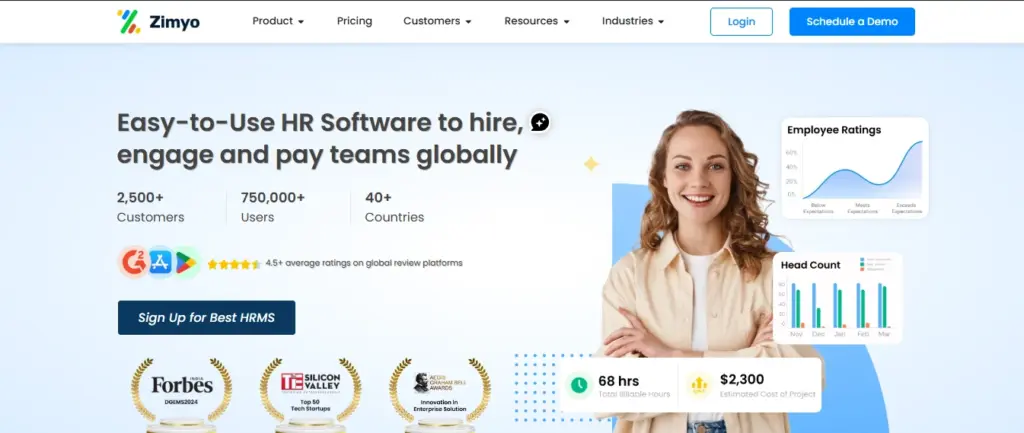
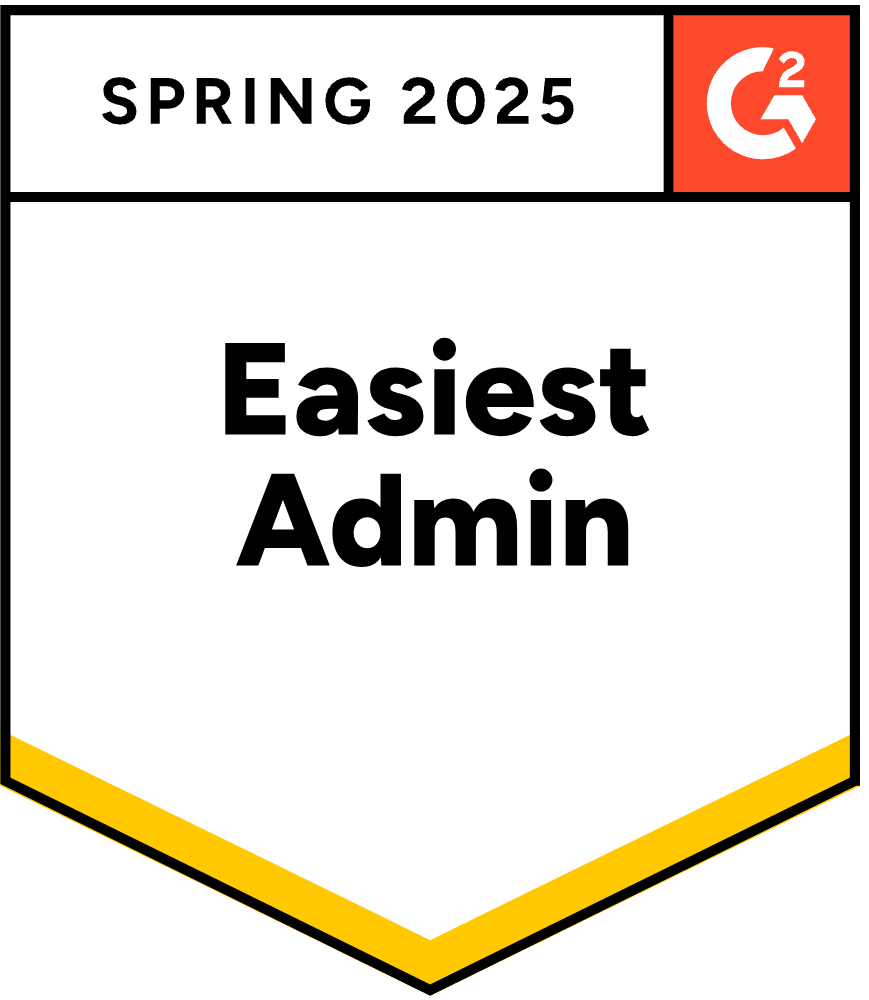
Key Features:
- Employee database management
- Automated payroll processing
- Performance management and OKRs
- Employee engagement tools (surveys, polls, recognition)
- Attendance and leave tracking
- Mobile-first HR experience
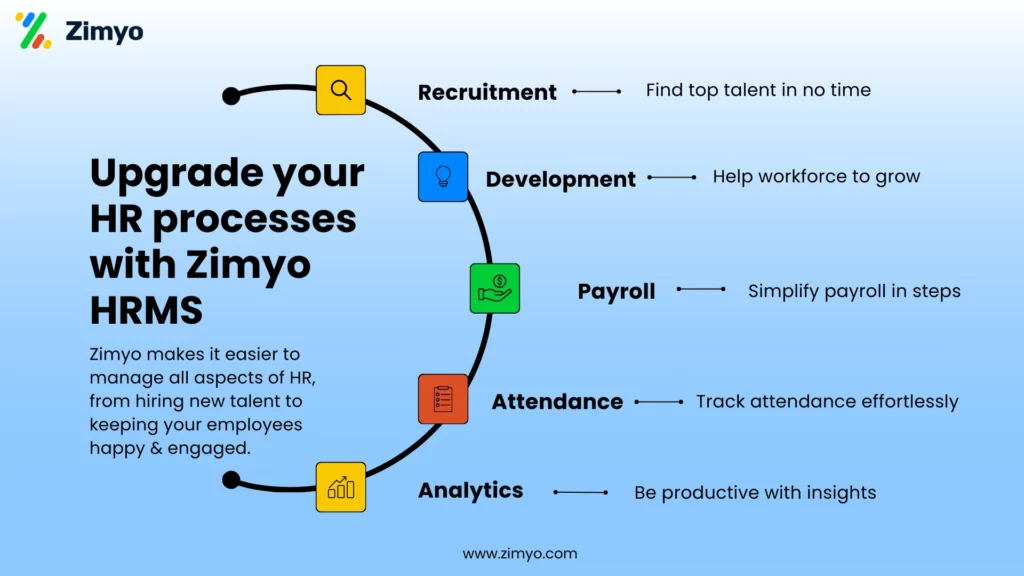
Pros:
- Affordable and tailored for small businesses
- End-to-end HR automation
- Highly customizable workflows
- Great customer support
Cons:
- Limited third-party integrations compared to bigger enterprise tools
2. Zoho People
Zoho People is part of the Zoho suite, making it an excellent option if you already use Zoho’s business tools. It’s quite suitable among small business HR software choices due to its scalability and easy-to-use interface.
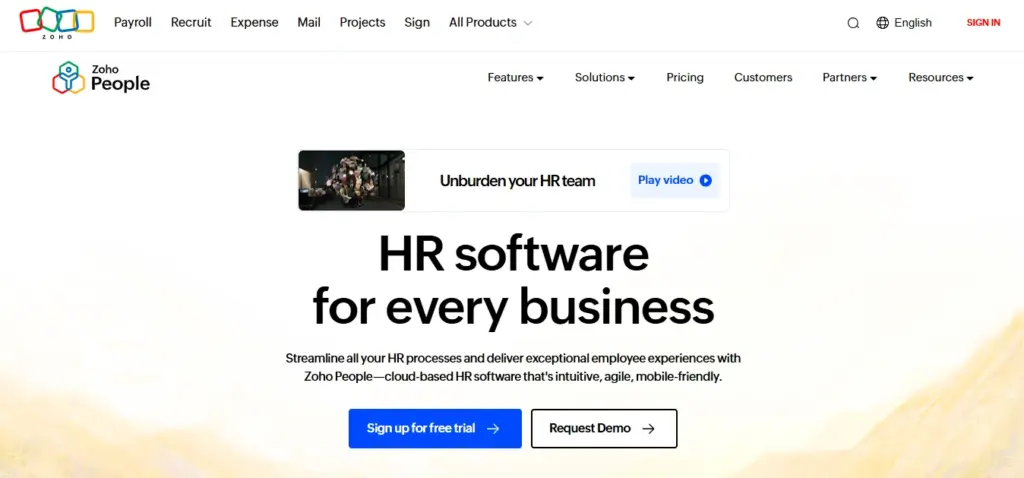
Key Features:
- Time and attendance management
- Shift scheduling
- Leave management
- Onboarding and employee lifecycle tracking
- Integrations with other Zoho apps and third-party platforms
Pros:
- Affordable pricing tiers
- Easy setup and integration
- Scalable for growing businesses
Cons:
- Some advanced features require higher-priced plans
- Not ideal for large-scale enterprise use
3. Gusto
Gusto is a popular choice in the US, particularly for payroll and compliance. It provides a combination of HR systems for small businesses with tax filing, benefits, and hiring features.
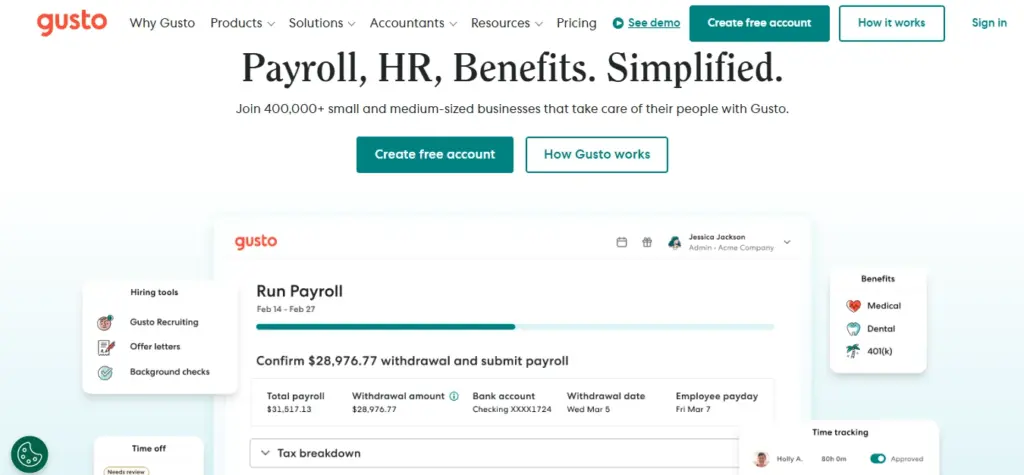
Key Features:
- Full-service payroll with tax filing
- Benefits management (health insurance, 401k, etc.)
- Onboarding and document management
- Time tracking
- Compliance assistance
Pros:
- User-friendly interface
- Great for payroll-heavy needs
- Transparent pricing
Cons:
- Limited global support (mainly US-focused)
- HR features are not as advanced as dedicated HRMS tools
4. Rippling
Rippling blends HR, payroll, and IT management into one platform. Small businesses that want an all-in-one tool to manage both employees and devices find it especially useful.
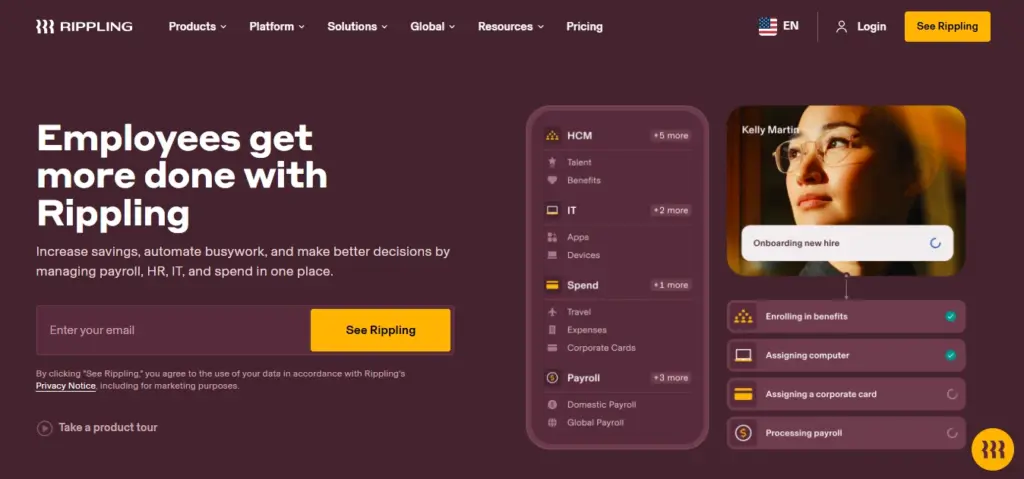
Key Features:
- Payroll and benefits
- Onboarding automation
- IT and device management
- HRIS for small businesses
- Workflow automation
Pros:
- Covers both HR and IT needs
- Excellent automation features
- Scales with business growth
Cons:
- Pricing is not transparent
- Some features may be overkill for very small businesses
5. Paycor
Paycor offers human resources information software with a focus on payroll and workforce management. It’s best suited for businesses that need compliance and analytics support.
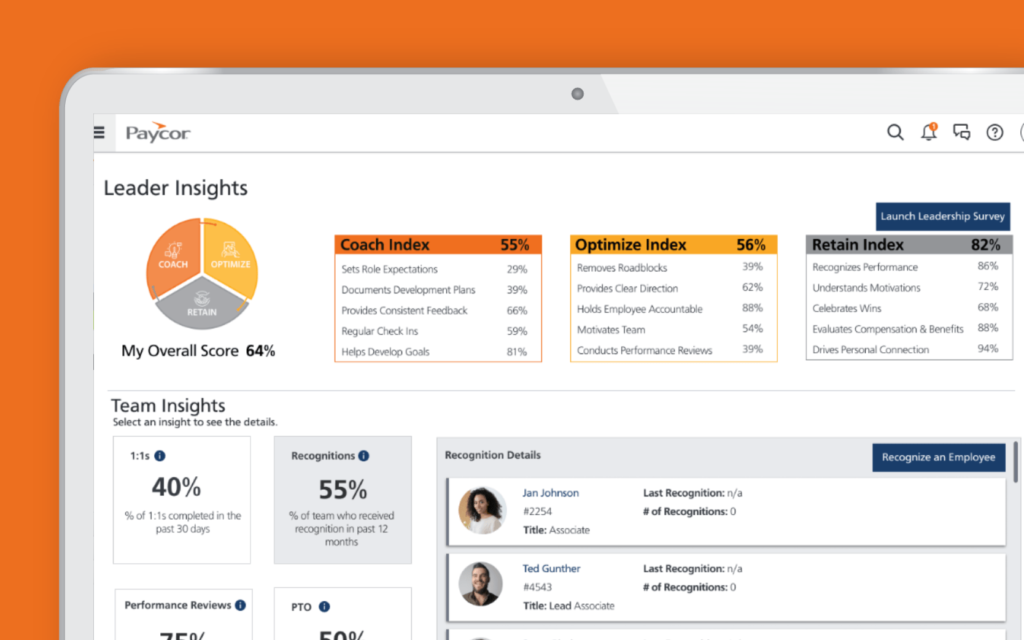
Key Features:
- Payroll and tax compliance
- Talent acquisition
- HR analytics
- Benefits management
- Performance reviews
Pros:
- Strong payroll capabilities
- Data-driven insights
- Good compliance tools
Cons:
- Interface can feel complex
- Customer support can be slow at times
6. Oracle HCM
Oracle HCM is a robust HRMS management platform typically used by larger organizations but can also serve fast-scaling startups.
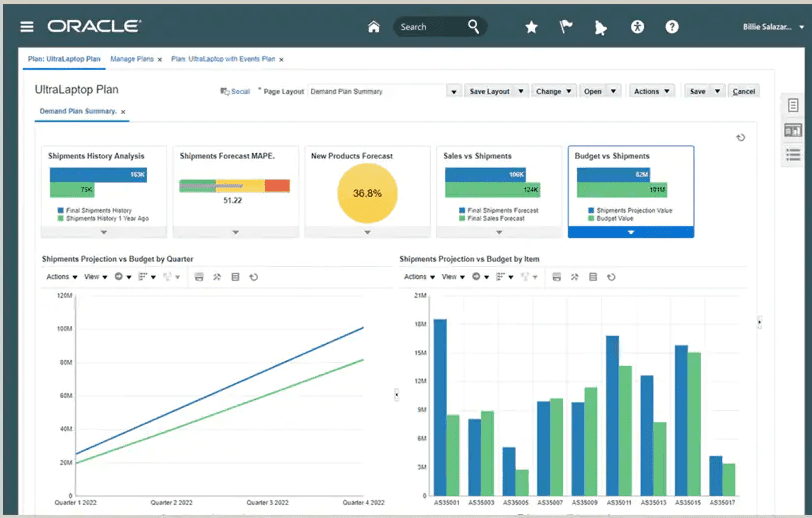
Key Features:
- Global HR management
- Payroll and benefits
- Workforce analytics
- Learning and development tools
- AI-driven recommendations
Pros:
- Enterprise-grade features
- Advanced analytics and AI
- Great for scaling beyond SMB level
Cons:
- Expensive for very small businesses
- Requires training and onboarding
7. ADP
ADP is one of the oldest and most reliable HR software providers. It’s considered the best human resources software for small businesses that want payroll as their core function.
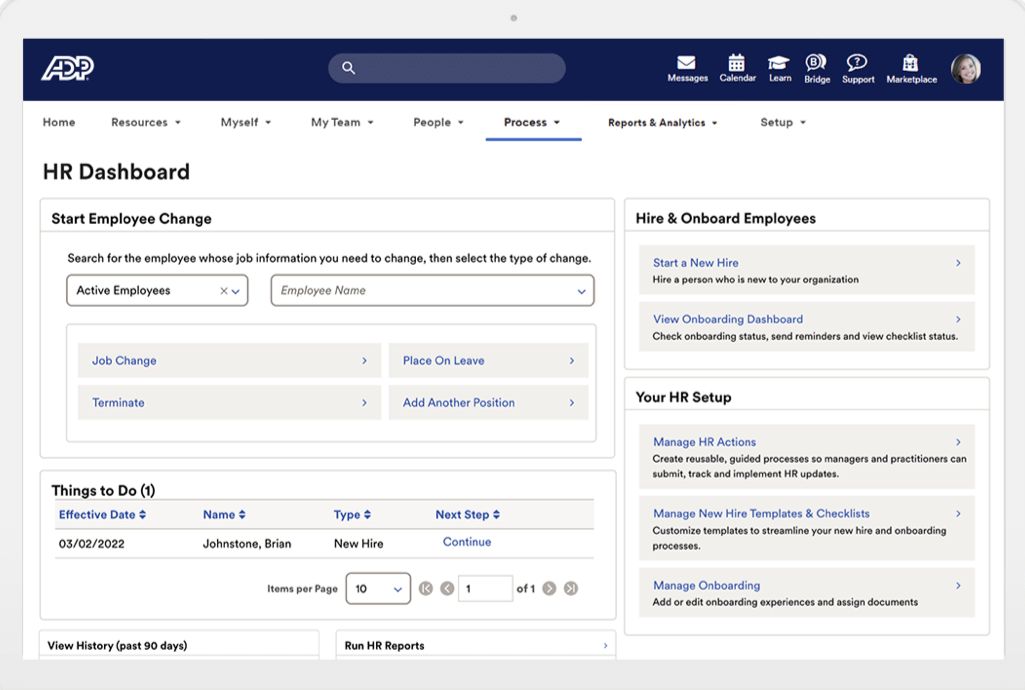
Key Features:
- Payroll and compliance
- HRIS for small business
- Benefits and retirement planning
- Time tracking
- Recruitment solutions
Pros:
- Reliable payroll services
- Strong compliance support
- Scalable solutions
Cons:
- Pricing not transparent
- May feel outdated compared to modern HR tech
8. BambooHR
BambooHR is one of the most popular HR systems for small businesses, known for its clean design and focus on people management.
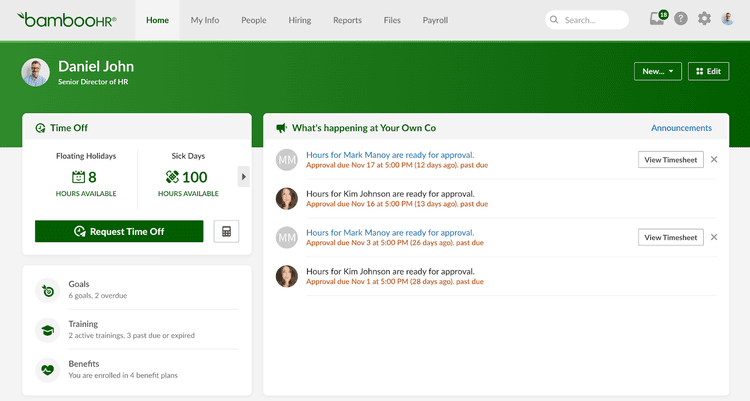
Key Features:
- Employee database management
- Applicant tracking system (ATS)
- Time-off tracking
- Onboarding workflows
- Performance management
Pros:
- Simple and intuitive UI
- Great for people-focused HR
- Easy implementation
Cons:
- Payroll add-on is extra
- Limited advanced analytics
9. DarwinBox
DarwinBox is a modern HRMS management platform focused on employee engagement and digital-first HR. It’s widely used across Asia and growing globally.
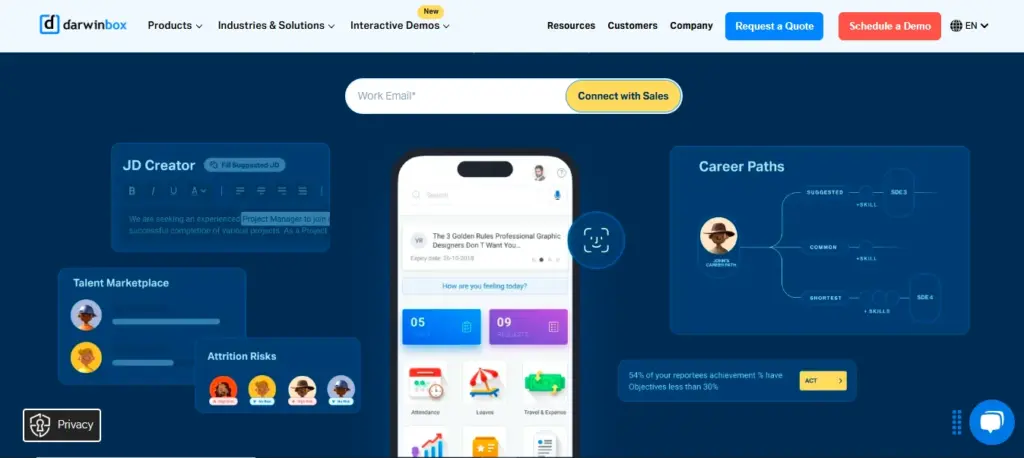
Key Features:
- Core HR and payroll
- Employee engagement tools
- Performance and learning modules
- Mobile-first HR experience
- HR analytics
Pros:
- Modern design
- Scalable for startups and enterprises
- Mobile-first approach
Cons:
- Customization can be complex
- Newer in global markets compared to competitors
10. SAP SuccessFactors
SAP SuccessFactors is a leading HR software designed for mid-sized to large businesses, but startups with high growth potential also benefit from its scalability.
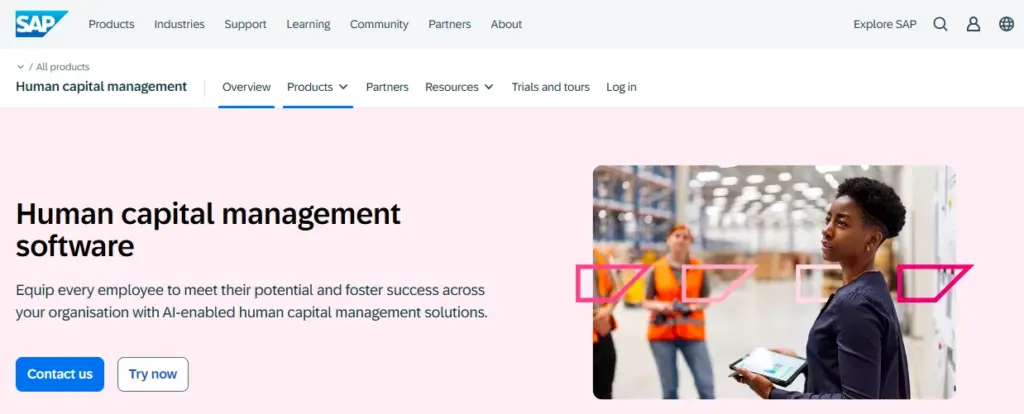
Key Features:
- Core HR and payroll
- Talent management
- Learning and development
- Succession planning
- Advanced analytics
Pros:
- Enterprise-grade features
- Great for global operations
- Robust compliance
Cons:
- Expensive for small businesses
- Complex to implement
11. Paylocity
Paylocity is a cloud-based HR software for small businesses that want payroll and workforce management in one place.
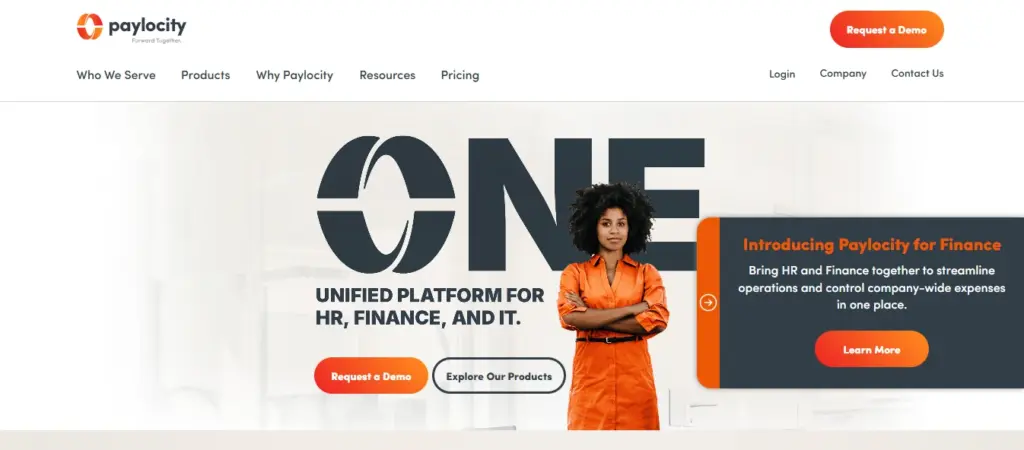
Key Features:
- Payroll automation
- Benefits administration
- Time and labor management
- Employee self-service portal
- HR analytics
Pros:
- Easy-to-use payroll system
- Strong self-service features
- Affordable plans
Cons:
- Limited integrations
- Some features feel basic
12. Deel
Deel is the best HR software for global startups and remote-first companies. It helps small businesses hire and manage employees/contractors worldwide.
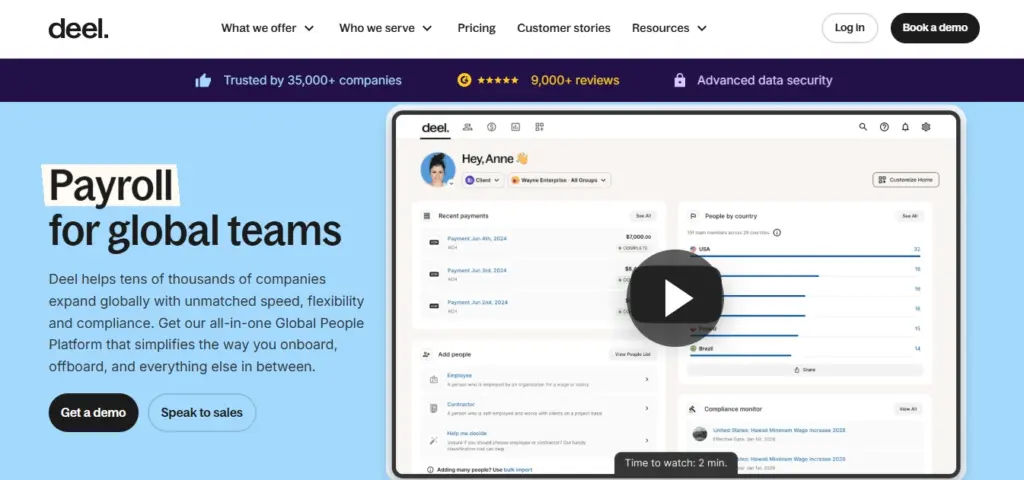
Key Features:
- Global payroll
- Employer of Record (EOR) services
- Compliance with local laws
- Contractor payments
- Multi-currency support
Pros:
- Great for global hiring
- Simplifies compliance in multiple countries
- Contractor-friendly
Cons:
- Expensive for purely local businesses
- Limited HR features beyond payroll & compliance
Comparison Table: Top 12 HR Software for Small Businesses
Here’s a quick comparison among the best HR software making it easy for you to pick.
Software | Best For | Key Strengths | Drawbacks |
Zimyo | SMBs/startups (global) | End-to-end HRMS, engagement tools | Selective integrations |
Zoho People | SMBs already using Zoho | Easy integration, scalable | Advanced features cost extra |
Gusto | US small businesses | Payroll & compliance | US-only, limited HRMS features |
Rippling | SMBs needing HR + IT | All-in-one HR + IT automation | Expensive for very small teams |
Paycor | Payroll & compliance | Strong payroll + analytics | Complex interface |
Oracle HCM | Scaling startups/enterprises | AI, analytics, global HR | High cost, complex setup |
ADP | Payroll-focused SMBs | Reliable, compliance-ready | Outdated UI, opaque pricing |
BambooHR | People-focused SMBs | Easy, intuitive, ATS + HRIS | Payroll add-on costs extra |
DarwinBox | Digital-first startups/SMBs | Mobile-first, engagement-focused | Customization takes time |
SAP SuccessFactors | Mid-to-large businesses | Talent management, compliance | Expensive, complex |
Paylocity | Payroll + workforce management | Payroll automation, self-service | Limited integrations |
Deel | Global/remote-first startups | International compliance, multi-currency | Expensive locally, limited HRMS |
Must-Have Functions in an HR Software
In selecting the best small business HR software, you require more than a payroll system. An effective HR system for small businesses should simplify life for employers and employees alike. The following are the must-have functions to consider:
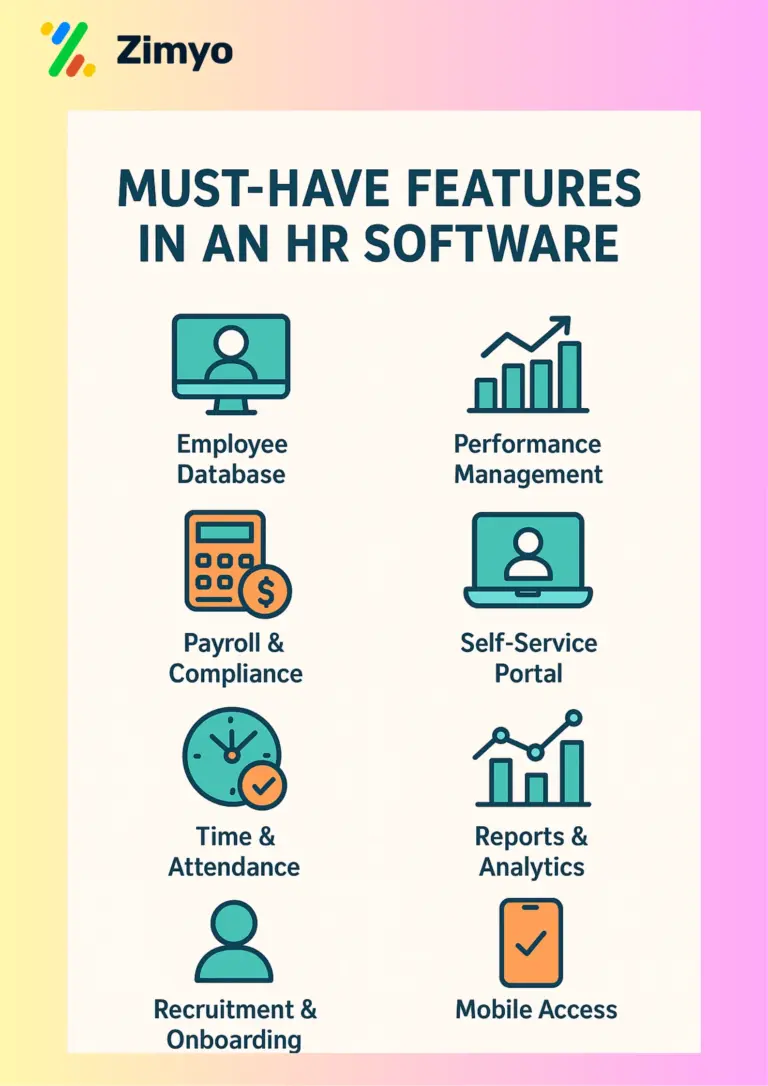
1. Employee Database – Secure and Centralized Records
Each expanding business requires a secure location to retain employee data. All employee information like personal data, documents, employment history, and performance, must be stored in one integrated database by your chosen human resources information software (HRIS). This will save you paperwork, minimize errors, and provide instant access to accurate information at any given time.
2. Payroll & Compliance – Automated Salary, Tax, and Legal Updates
One of the largest hurdles for small firms is payroll. The ideal small business HR software should encompass automated compliance and payroll functionalities. And ensure correct calculation of salaries, taxes, and statutory deductions. This removes hours of manual effort and ensures organizations remain compliant with labor laws and regulations.
3. Time & Attendance
Small businesses cannot risk time theft or irregular attendance reports. That’s why HR software for small businesses needs to come equipped with a built-in time and attendance tracker. Which allows managers to keep tabs on check-ins, work hours, overtime, leaves, and absences, all while synchronizing directly with payroll for proper payouts.
4. Recruitment & Onboarding – Faster Hiring and Smooth Onboarding
Recruitment of the correct talent is necessary for small companies. The finest human resources software for small business must make hiring easier with job posting, resume screening, applicant tracking, and electronic onboarding capabilities. With a smooth onboarding process, new employees are motivated from day one, improving retention.
5. Performance Management – Feedback, Reviews, and Career Development
Employee performance is the key to business success. The ideal HRIS for small business must facilitate ongoing performance monitoring using the features of goal-setting, 360-degree feedback, and appraisal cycles. This helps keep employees motivated, gets them timely recognition, and enables their growth in the job.
6. Self-Service Portal – Empower Employees with Independence
Contemporary employees wish to handle their own HR duties without having to approach HR departments for every minute detail. An HR self-service portal allows employees to request leaves, access payslips, change personal details, or submit requests without assistance. This proves to be time-saving for both employees and HR administrators.
7. Reports & Analytics – Data for Smarter Decisions
Data-driven insights are critical for scaling. A good HRMS management system must enable detailed reports and analytics. Which means workforce trends, attrition percentages, payroll expenditure, and attendance insights. These enable small businesses to make informed decisions, streamline operations, and plan for future growth.
8. Mobile Access – Manage HR on the Go
Today’s employee base is on the move, and so must be HR. An ideal HR software for small companies should have an accompanying mobile app that enables managers and staff to view HR services at any time, from anywhere. From approving leave applications to recording attendance, or simply viewing payslips, mobile access makes HR flexible.
How to Select the Right HR Software
Choosing the right HR solution isn’t just about picking the most popular one—it’s about finding the best small business HR software that fits your unique needs. Every small business operates differently, and HR priorities vary based on size, industry, and growth stage.
Here’s a step-by-step guide to selecting the right HR software for small businesses:
1. Define Your Business Needs
Ask yourself:
- Do you mainly need payroll management?
- Are recruitment and onboarding a bigger challenge?
- Do you need strong compliance tools?
Identifying your priorities helps you focus on the right features instead of paying for extras you don’t use.
2. Set a Realistic Budget
Small businesses often hesitate to invest in HR tools because of cost. But remember a good software saves money in the long run by reducing errors, improving compliance, and saving time. Look for flexible plans that scale as your team grows.
3. Check Ease of Use
The best human resources software for small business should be easy enough for anyone to use without long training sessions. A clean interface, intuitive dashboards, and mobile access are must-haves for small teams.
4. Evaluate Scalability
Today you might have 20 employees. But what about when you grow to 200? Choose HR systems for small businesses that can scale with your growth. This avoids costly migrations later.
5. Look at Integration Options
Check if the HR software integrates with your accounting, CRM, project management, or communication tools. This ensures smooth data flow and avoids duplication.
6. Prioritize Security & Compliance
Employee data is sensitive. Ensure your chosen HRIS for small business complies with data protection laws and has strong security measures in place.
7. Test Before You Buy
Nearly all HR vendors provide free trials or demo versions. Utilize these to pilot the platform with your team. This will provide you with practical insights prior to committing.
Pro Tip: Always engage your HR team (or the individual responsible for HR) in making the selection decision - they're most familiar with the pain points.
Benefits of Using HR Software
Installing HR software for small companies isn’t merely a matter of simplifying life, it’s about building long-term benefits for your company and staff.
Here’s how top small business HR software helps your company:
1. Saves Time & Boosts Efficiency
HR tasks such as payroll, attendance recording, or leave approvals consume hours per week. Automating them frees you up with precious time to spend on building your company.
2. Minimizes Errors
Spreadsheets can be error-prone. A single misplaced entry can cause salary miscomputations or penalties for non-compliance. With an HRMS management system, accuracy significantly increases.
3. Maximizes Compliance
Small businesses tend to have difficulty complying with labor laws and regulations. Contemporary HR software systems for small businesses have compliance updates, so you’re worry-free.
4. Increases Employee Experience
Employees enjoy self-service. Downloading payslips, requesting leave, or modifying information hence employees are self-sufficient with HR software, able to handle their own requirements without HR’s approval.
5. Supports Remote & Hybrid Work
Remote working isn’t going anywhere in 2025. Cloud-based HRIS solutions make it a certainty that employees are able to clock-in attendance, view shifts, or send out requests for time-off wherever they are.
6. Data-Driven Decisions
With human resources information software, you can create in-depth reports on performance, turnover, and attendance. It assists in the identification of bottlenecks and making more informed business decisions.
7. Improves Retention
When HR processes are streamlined, employees become valued and contented. A smooth experience contributes to increased engagement and reduced turnover.
8. Scales With Growth
Good HR software scales with your business. Whether you hire 5 or 500 workers, the system scales without impacting operations.
Trends in HR Software for 2025
The landscape of HR technology is changing quickly, and small businesses must keep up. The following are the leading HR software trends that are driving 2025:
1. AI-Driven Recruitment & HRIS
Artificial Intelligence is changing the way small business hires. AI-driven HRIS for small business can read resumes, shortlist candidates, and even forecast employee turnover, freeing small businesses from hours of manual work.
2. Employee Well-being & Engagement Tools
New HR isn’t all about the payroll, it’s about humans. Look for more HR software to have wellness check-in features, mood surveys, and engagement analytics.
3. Mobile-First HR Systems
Staff members increasingly want to handle HR activities on their mobile phones. From punching in to accessing payslips, HR software designed for use on mobiles is on the rise.
4. Virtual HR Assistants & Chatbots
HR chatbots are taking off. Staff members can inquire about leave balances, benefits, or policies and receive immediate answers without needing human resource intervention.
5. HR, IT & Finance integration
Platforms such as Rippling are setting the pace by merging HR, IT, and finance into one system. This eliminates silos and results in efficiency.
6. Evolved People Analytics
Increasingly, more companies are employing analytics to forecast hiring requirements, streamline workforce planning, and minimize turnover. HR software systems for small companies are now providing evolved analytics dashboards previously reserved for large companies.
7. Highlight DEI (Diversity, Equity & Inclusion)
HR software is also integrating DEI tracking capabilities to enable companies to build equitable, inclusive workspaces.
Takeaway: Small companies that embrace these trends early will reap a significant competitive edge in attracting and retaining talent.
Final Thoughts
HR isn’t just about paperwork anymore, it’s about people, culture, and growth. And for small businesses, having the right HR system can be a game-changer.
The Top HR Software Choices for Small Businesses we explored—Zimyo, Zoho People, Gusto, Rippling, and Paycor—all bring unique strengths to the table:
- Zimyo – Best all-in-one HRMS with strong employee experience focus.
- Zoho People – Affordable, great for startups and Zoho ecosystem users.
- Gusto – Best for payroll-centric small businesses.
- Rippling – Best for tech-centric, remote, or international SMBs.
- Paycor – Best for heavily compliance-based industries.
Other options such as BambooHR, DarwinBox, ADP, Deel, SAP SuccessFactors, and Oracle HCM are great alternatives depending on where you are in your growth cycle and in what industry.
Why You Should Act Now
Delaying investment in HR software means continuing to waste time on manual processes, risking compliance issues, and offering employees a subpar experience. On the other hand, adopting the best human resources software for small business helps you:
- Save time and money
- Improve accuracy and compliance
- Empower employees
- Focus on growth instead of admin tasks
Final Advice
When choosing your HR system, focus less on what’s “popular” and more on what fits your business needs. Test different options, involve your HR team, and look for scalability.
The right HR software for small businesses doesn’t just make HR easier, it transforms how you run your company, engage your employees, and plan for the future.
FAQs
What's the best HR platform for small businesses?
Zimyo is one of the best HR platforms for small businesses because it combines payroll, attendance, employee engagement, and performance management in one easy-to-use system. It’s cost-friendly, scalable, and designed specifically for SMBs.
What is the most used HR software?
Both SMEs and large companies prefer Zimyo for its affordability and simple HRMS management features. Zimyo is widely adopted in India and globally for payroll, compliance, and employee management.
What is the most popular small business HR software?
Zimyo is among the most popular HR software for small businesses. Zimyo leads for its affordability, localized compliance support, and employee-friendly HRIS features, making it a go-to choice for startups and SMBs.
What are the 5 types of HRIS systems?
The five main types of HRIS (Human Resource Information Systems) are:
- Operational HRIS – Core employee data, payroll, and attendance (offered by Zimyo).
- Tactical HRIS – Recruitment, onboarding, training, and appraisals.
- Strategic HRIS – Workforce planning and talent analytics.
- Comprehensive HRIS – A full-suite solution combining all HR functions (Zimyo provides this).
- Limited-function HRIS – Specific modules like only payroll or leave management.



